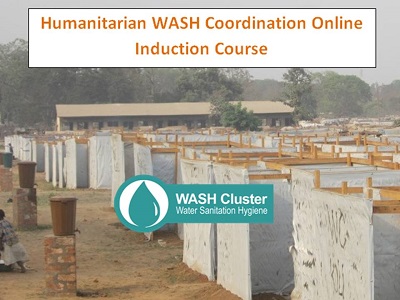Sectorial/cluster coordination has become an essential aspect of the humanitarian WASH response. Designed to support WASH personnel – whether UN, NGO or Governmental staff – undertaking a coordination function for the first time, this course seeks to provide a grounding in the basics of the WASH coordination system and tools.
GWC WASH COORDINATION TRAINING PATHWAY
This course is part of the GWC training pathway, created for both WASH Cluster partners and UNICEF staff involved in coordination to ensure efficient WASH coordination in humanitarian action. This training pathway includes the following courses, all available in AGORA's catalogue:
- Partners' briefing on Humanitarian WASH coordination: Three successive face-to-face briefing modules providing essential information on partners’ roles to actively participate in humanitarian WASH Coordination. For all WASH partners involved in humanitarian response
- Humanitarian WASH Coordination Induction: 2 days online training providing essential information and tools to coordinate the WASH Cluster. For WASH partners or new UNICEF WASH staff fulfilling a WASH coordination role. Some sections are specific to IMO
- WASH Operational coordination (WOC): 5 days of residential training providing operational tools and skills for WASH coordination. For Humanitarian WASH cluster/sector coordinators
- WASH Leadership & coordination (L&C). 5-day residential training to strengthen the skills for leading a humanitarian WASH coordination platform. For Humanitarian WASH cluster/sector coordinators
- Government Led coordination of WASH in Emergency (GoLWIE, not yet on Agora). A several-day workshop aiming at strengthening the role of national and regional governments in leading and coordinating the humanitarian WASH response. Under the pilot phase. Contact GWC if you are interested in piloting a GoLWIE in your country
- Market-based programming for WASH in Emergency (MBPWIE): 5-day residential training to strengthen the skills of WASH practitioners on Market and Cash-related tools used for WASH programming
- GWC Information Management Training: 5-day residential training to provide Information Management Officers with advanced skills to support information management for WASH coordination platforms during emergencies
- Coordinated assessment process: Planned for 2020
- WOC and L&C training of trainers: this ToT is specifically designed to train high-level UNICEF staff and partners to deliver the WOC and L&C training in autonomy
Aim of the course
Provide WASH professionals new to humanitarian coordination with the essential starting knowledge, basic capacity, and essential tools for carrying out the main WASH humanitarian coordination-related tasks.
Learning objectives
- Understanding the humanitarian context and Humanitarian Program Cycle (HPC)
- Getting essential knowledge about the Humanitarian WASH Coordination system, architecture, functions, and roles throughout the HPC
- Listing all tasks of a humanitarian WASH coordination platform, and knowing the tools on the GWC Coordination Tool Kit that will support their implementation.
Audience
This course is mandatory for the following persons at the beginning of their contract/assignment:
- Any staff joining the Global WASH Cluster (GWC) or the GWC Field Support Team (FST) for the first time
- Any staff from GWC standby partners taking on a Humanitarian WASH coordination function for the first time
- Any staff of UNICEF having a humanitarian WASH coordination role
- UNICEF chiefs of WASH.
This course is recommended for the following persons:
- Any WASH partner staff taking on a Humanitarian WASH coordination function (at global, regional, national or sub-national level) for the first time
- Governmental officers from ministries involved in humanitarian WASH coordination
- All UNICEF staff involved in managing WASH programmes.
Length
The induction lasts approximately 2 full days, preferably done before the assignment. The activities planned during the induction include looking for and analyzing documents relevant to the context of his/her future assignment, which requires a significant amount of time.
Venue and material requirements
Induction is done as e-learning, so only a computer and an internet connection are needed, as well as a quiet room (home or office).
Facilitation team requirement
Participants are expected to complete this course in autonomy. However, depending on the nature of the deployment, a face-to-face or Skype meeting with key coordination staff at the global or regional level might also be organized before or after this online course.
Methodology
The induction course consists of a detailed and interactive exploration of the main chapters of the online GWC Coordination Tool Kit (CTK). Modules follow the same structure as the CTK chapters. Each module is followed by a 15-minute knowledge evaluation, which needs to be completed in order to validate the module and go to the next one.
